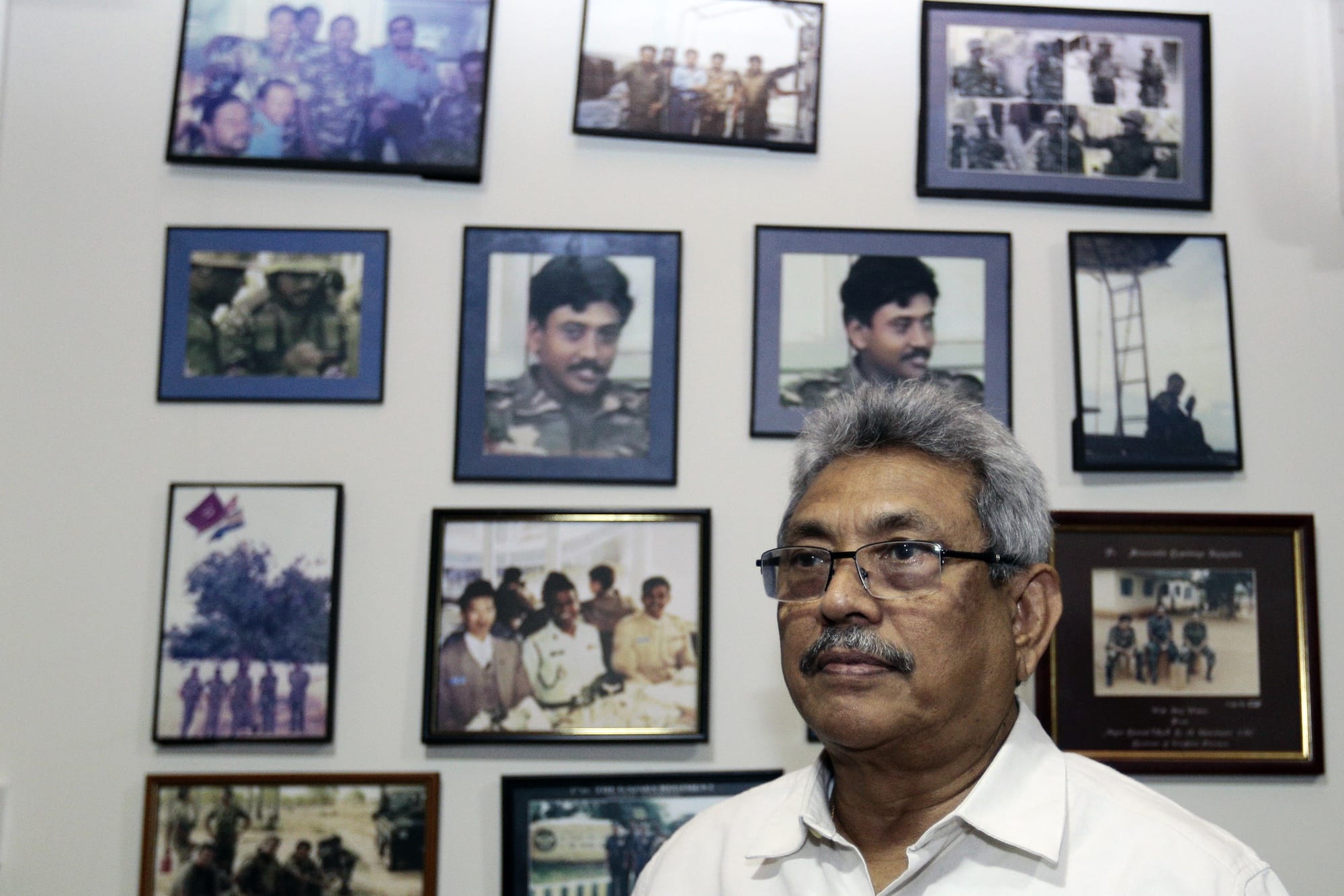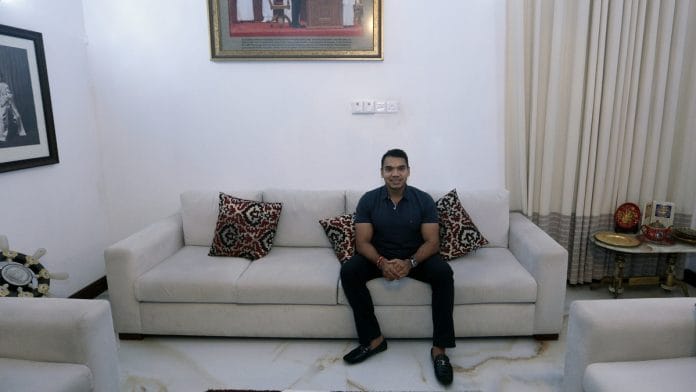They are back as unexpectedly as they fell.
New Delhi/Colombo: In a compound secured by the Sri Lankan elite special task force that protects the island nation’s top leaders, beneath framed photos of himself in army uniform, the brother of the country’s newly installed prime minister Mahinda Rajapaksa is mulling a presidential run.
“I’m not interested in actually becoming a minister,” Gotabhaya Rajapaksa, who was appointed by his brother to be Sri Lanka’s defense secretary in 2005 just before the climax of a brutal 26-year civil war, said in an interview. “But a lot of people want me to contest for the presidency.”
In a country where it is common to appoint family members to run key ministries, the comments aren’t much of a surprise. But they suggest the Rajapaksa clan is preparing to once again dominate politics in a nation it controlled from 2005 and 2015, when the family lost power in an election shock.
Now they are back, nearly as unexpectedly as they fell. In a surprise move last Friday, President Maithripala Sirisena fired his former ally Ranil Wickremesinghe as prime minister and appointed the mustachioed former president as his replacement.
The move stunned everyone from officials at international ratings agencies — who fear the chaos threatens debt repayments — to activists who worry the return of Sri Lanka’s strongman could erode improvements in civil liberties. There’s also renewed concerns the island nation will once again tilt toward China, which holds much of the enormous debt racked up during Rajapaksa’s previous rule, even if Colombo is not as enthusiastic as before.

“Rajapaksa learned hard lessons from his last experience dealing with China on Belt and Road investments,” said Andrew Small, a senior fellow with the German Marshall Fund’s Asia program. “Although Beijing will be happy to see his return — and was expecting it in the next round of elections anyway — it is unlikely that the dynamic will be the same as the last time he was in power.”
Strong Support
Rajapaksa could cement his return to power later this month when Sirisena reconvenes parliament, even as Wickremesinghe contests his removal as “blatantly illegal” and refuses to vacate the prime minister’s official mansion. Rajapaksa has already taken on additional duties as finance minister, pledged to simplify the tax code and is working with advisers on the country’s next budget.
Across Colombo, freshly plastered-up posters show a smiling Rajapaksa, who had triumphed against Wickremesinghe’s administration in local elections earlier this year. Despite the controversial way in which he reclaimed power, the leader still enjoys strong domestic support for his role in ending the war, particularly among Sri Lanka’s Sinhala majority.
Unlike Wickremesinghe, who wears western suits and seems more comfortable in Colombo’s halls of power and foreign capitals, Rajapaksa is from the country’s rural, southern Hambantota district. He dresses in traditional Sri Lankan robes, speaks in a folksy stream-of-consciousness manner and is very superstitious, wearing rings and bracelets he believes ward off misfortune.
As his government launched a final assault on the Tamil Tigers in 2009, his administration was condemned by human rights groups for extrajudicial killings, forced disappearances and detaining journalists and activists.
“The previous Rajapaksa government that included several family members refused to accept responsibility for serious allegations of human rights violations,” says Meenakshi Ganguly, South Asia director at Human Rights Watch. There are fears that “a Rajapaksa administration will continue human rights violations in the guise of nationalism and security.”
First Family
At his residence on the outskirts of the capital Colombo, Gotabhaya Rajapaksa told Bloomberg many international observers don’t fully appreciate Sri Lanka’s conflict had turned Colombo and other parts of the country into a war zone, with daily car bombs and suicide attacks. Their Tamil Tiger opponents, he said, had full control over large tracts of territory and had similar weaponry to the armed forces.
“Whether it is in Sri Lanka or another country, war is not a good thing,” he said. “It’s an ugly thing. But we didn’t create the war. Mahinda Rajapaksa didn’t create the war. We ended the war.”
Rajapaksa’s brother denied the new government would once again lean on China to provide loans.
“We did not favor any particular country,” he said. “We want to work with anybody who wants to work with Sri Lanka, whether it’s west or east or whatever. And also we want to work with international organizations, but they have to be fair.”
‘Financial Crisis’
Wickremesinghe, meanwhile, continues to fight.
He told Bloomberg he has the numbers to triumph over his rival in a vote when the suspended parliament reconvenes.
He said Rajapaksa’s administration racked up debts it couldn’t repay, and the unity government of Sirisena and Wickremesinghe had to “take the burden.” Now, he added, the political crisis threatens Sri Lanka’s looming debt payments.
“Without legitimacy, how can you deal with debt?” Wickremesinghe asked. “A constitutional crisis is enough to create a financial crisis.”
‘Political Turbulence’
At an intersection on the outskirts of Colombo, a billboard of the entire Rajapaksa family looms down. Mahinda and Gotabhaya are there, as is the other brother and former lawmaker Basil, and son Namal, a current lawmaker.
The sign sends “good wishes to the new prime minister,” but has an ominous message for the old one. “Keep your self respect and leave,” it warns. “Otherwise we know how to get rid of you. This battle is not over. We are alert!”
Some western diplomats are not yet engaging with any of the government’s newly-appointed cabinet ministers while Rajapaksa’s appointment is still being contested.
Still, Namal Rajapaksa insisted Sri Lanka would continue to pay its debts, and that his father’s Chinese-funded infrastructure projects had brought value to the country. He said their move to oust Wickremesinghe was constitutionally valid.
“It hasn’t brought instability into the country, it’s just political turbulence,” Rajapaksa said. “Our main objective in this entire process is to make sure that economic, political and social stability is brought back to the country.”
At a cafe near his father’s residence, a family presses in to get a selfie with the son of the new prime minister. Sharon Fernandes, 22, said her family are supporters of the Rajapaksa clan.
“A lot of people respect them because they actually stopped the war,” she said. “The current government hasn’t really done much — they promised a lot, but haven’t really done anything.”-Bloomberg







Some years ago, China’s ambassador to Nepal told his Indian counterpart, We intend to do all that you have been doing so far. The dragon seems to be keeping its word. Bangladesh will be the next theatre for this war.